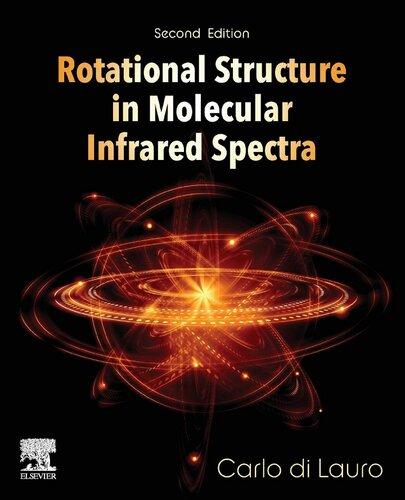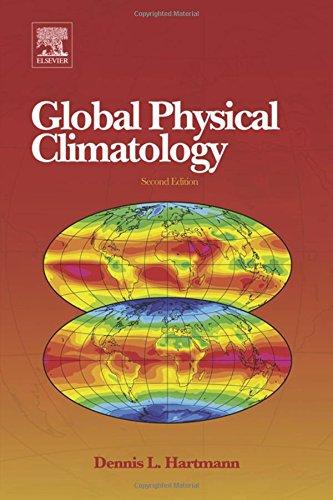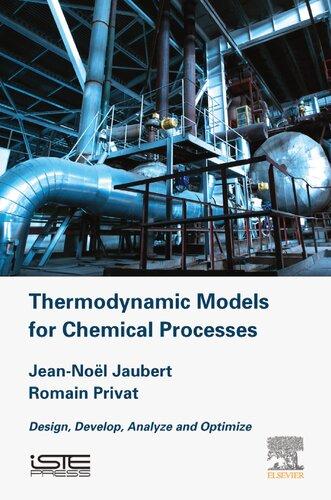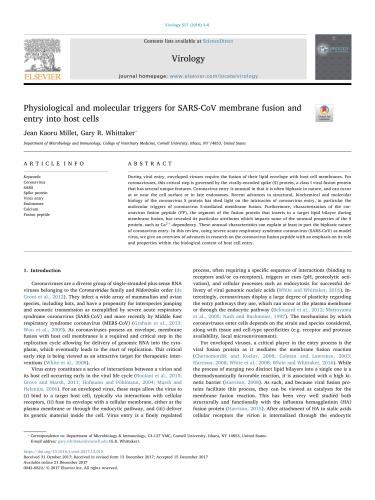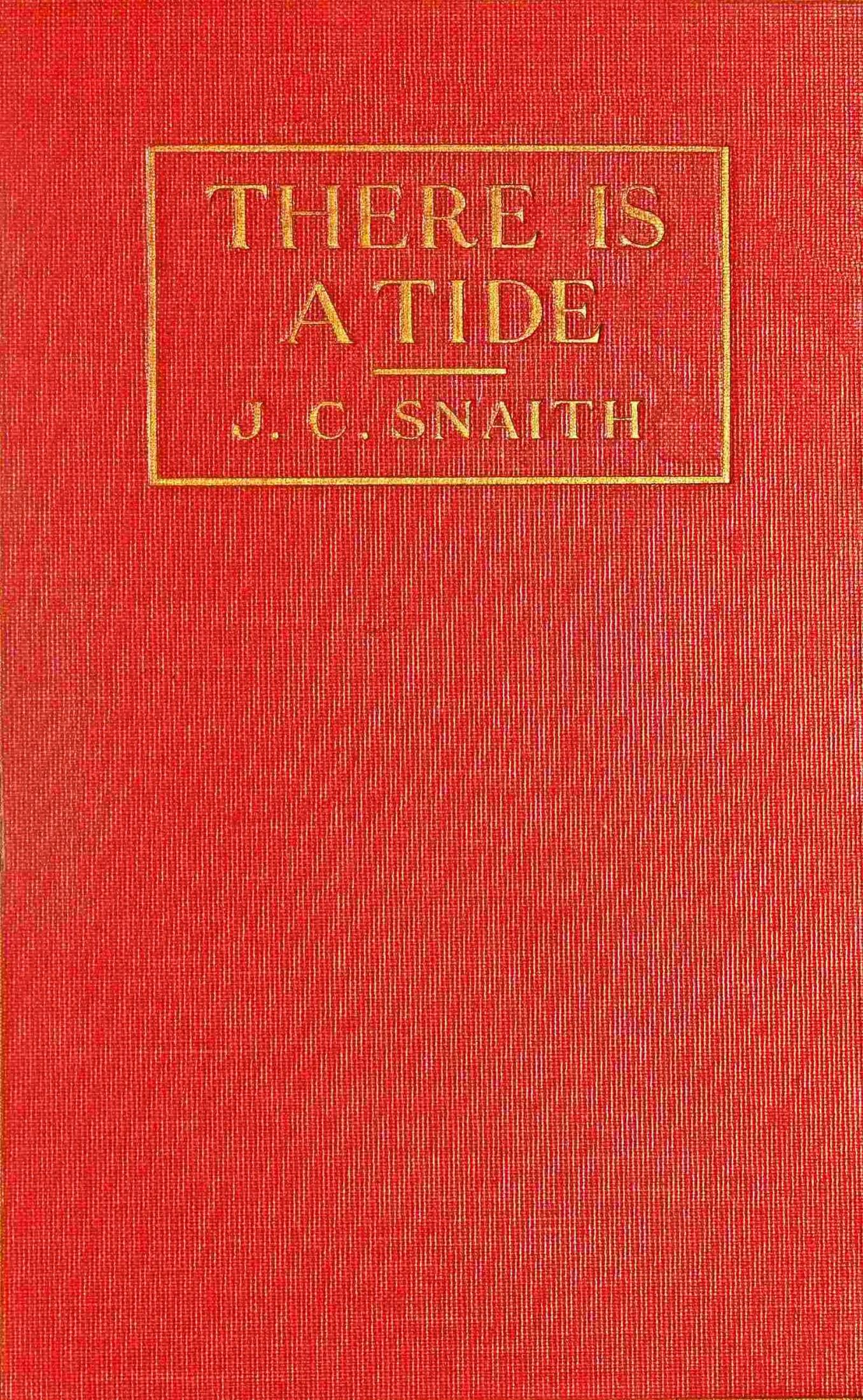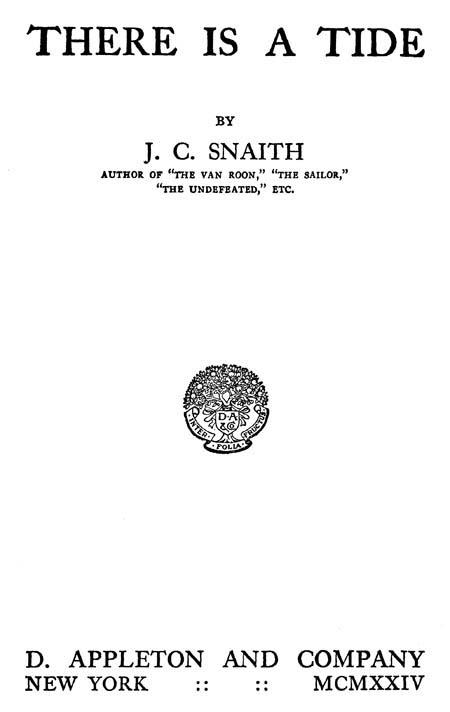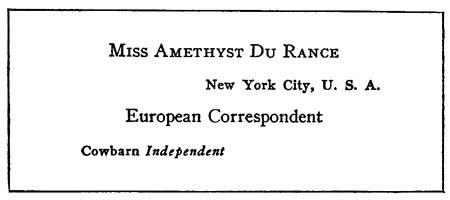Dedication
Thisbookwascowrittenbyhisfather inmemoryofYannRobert,towhomhissisterCatherinemust nowbeassociated
Forewordtosecondeditionxiii
Foreword xv Acknowledgments xvii
I.Introduction1
II.Generalequations11
II.1 Introduction11
II.2 Dipoleautocorrelationfunction12
II.2.1 Generalformalism12
II.2.2 TheHamiltonianofthemolecularsystem16
II.3 Toward “conventional” impacttheories18
II.3.1 Generalpropertiesofthecorrelationfunction19
II.3.2 Thebinarycollisionapproximation20
II.3.3 Initialstatisticalcorrelations22
II.3.4 Theimpactapproximation22
II.4 Beyondtheimpactapproximation25
II.5 Effectsoftheradiatortranslationalmotion27
II.6 Collision-inducedspectra31
II.7 Conclusion36
AppendixII.A Spectralandtimedomainprofilesinvariousspectroscopies36
II.A1 Absorption,emission,anddispersion36
II.A2 RayleighandspontaneousRamanscatterings38
II.A3 NonlinearRamanspectroscopies41
II.A4 Time-resolvedRamanspectroscopies45
AppendixII.B Somecriteriafortheapproximations47
II.B1 Thelargenumberofperturbers47
II.B2 Thelocalthermodynamicequilibrium48
II.B3 Thebinarycollisions51
II.B4 The(full)impactassumption53
AppendixII.C Theimpactrelaxationmatrix54
II.C1 Analysisthroughthetimedependence54
II.C2 Analysisthroughthefrequencydependence59
AppendixII.D TheLiouvillespace60
AppendixII.E Theresolventapproach62
II.E1 Spectral-shapeexpression62
II.E2 Rotationalinvariance65
II.E3 Detailedbalance66
III.Isolatedlines69
III.1 Introduction69
III.2 DopplerbroadeningandDickenarrowing81
III.2.1 TheDopplerbroadening81
III.2.2 TheDickenarrowing82
III.3 Basicmodelsforspectrallineshapes84
III.3.1 TheLorentzprofile84
III.3.2 TheDickeprofile86
III.3.3 TheVoigtprofile86
III.3.4 TheGalatryprofile88
III.3.5 TheNelkin Ghatakprofile89
III.3.6 Correlatedprofiles90
III.3.7 Characteristicsofthebasicprofiles93
III.4 Speed-dependentline-shapemodels98
III.4.1 Observationofspeed-dependentinhomogeneousprofiles98
III.4.2 Basicspeed-dependentprofiles107
III.4.3 TheRautian Sobelmanmodel114
III.4.4 TheKeilson Storermemorymodel125
III.5 Abinitioapproachesofthelineshape138
III.5.1 TheWaldmann Sniderkineticequation139
III.5.2 ThegeneralizedHessmethod141
III.5.3 Collisionkernelmethod143
III.5.4 ApproachesfromasimplifiedWaldmann Sniderequation147
III.6 Newachievementssince2008152
III.6.1 Directpredictionfrommoleculardynamicssimulations153
III.6.2 Usingakineticequation154
III.6.3 Relativisticanddispersioncorrectionstoline-shapemodels158
III.6.4 Phenomenologicalline-shapemodels159
III.6.5 Pressure-broadeningand-shiftingcoefficients163
III.6.6 Availabledata169
III.7 Conclusion173
AppendixIII.A Computationalaspects174
III.A1 AlgorithmsfortheVoigtandGalatryprofiles175
III.A2 Computationofspeed-dependentprofiles177
IV.Collisionallinemixing(withinclustersoflines)181
IV.1 Introduction181
IV.2 Thespectralshape189
IV.2.1 Approximationsandgeneralexpressions189
IV.2.2 Asymptoticexpansions194
IV.2.3 Computationalaspectsandrecommendations205
IV.3 Constructingtheimpactrelaxationmatrix210
IV.3.1 Simpleempirical(classical)approaches211
IV.3.2 Statisticallybasedenergygapfittinglaws218
IV.3.3 Dynamicallybasedscalinglaws226
IV.3.4 Semiclassicalmodels239
IV.3.5 Quantummodels251
IV.4 Determiningline-mixingparametersfromexperiments260
IV.4.1 Introduction260
IV.4.2 Relaxationmatrixelements264
IV.4.3 First-orderline-couplingcoefficients266
IV.4.4 Mixedtheoreticalmodelandmeasuredspectrafittingapproaches269
IV.5 Literaturereview269
IV.5.1 Availableline-mixingdata270
IV.5.2 Comparisonsbetweenpredictionsandlaboratorymeasurements271
IV.5.3 Comparisonsbetweenpredictionsandatmosphericmeasurements273
IV.6 Newachievementssince2008273
IV.6.1 Requantizedclassicalmoleculardynamicssimulations274
IV.6.2 Quantalapproaches274
IV.6.3 RefinedsemiclassicalRobert Bonamyformalism275
IV.6.4 Fullyclassicalformalism276
IV.6.5 Dynamicallybasedscalinglaws278
IV.6.6 Energy-gapfittinglawsandstate-to-statecrosssections279
IV.6.7 Theovaloidsphereandhardcollisionmodels279
IV.6.8 Kochanov’sapproach279
IV.6.9 Availabledata280
IV.7 Conclusion281
AppendixIV.A Vibrationaldephasing282
AppendixIV.B Perturbedwavefunctions286
AppendixIV.C Resonancebroadening287
V.Thefarwings(beyondtheimpactapproximation)291
V.1 Introduction291
V.2 Empiricalmodels293
V.2.1 The χ factorapproach293
V.2.2 Thetabulatedcontinua297
V.2.3 Otherapproaches298
V.3 Farwingscalculations:thequasistaticapproach299
V.3.1 Generalexpressions299
V.3.2 Practicalimplementationandtypicalresults302
V.3.3 Thebandaveragelineshape:backtothe χ factors305
V.4 Fromresonancetothefarwing:aperturbativetreatment308
V.4.1 Generalexpressions308
V.4.2 Illustrativeresults310
V.5 Fromresonancetothefarwing:anonperturbativetreatment311
V.5.1 Generalexpressions312
V.5.2 Illustrativeresults314
V.6 Newachievementssince2008317
V.6.1 Directpredictionsfromclassicalmoleculardynamicssimulations317
V.6.2 NonMarkovianenergy-correctedsuddenapproach319
V.6.3 Asymptoticlineshapeand χ -factorempiricalmodels319
V.6.4 TheMT_CKDwatervaporcontinuum320
V.6.5 Availabledata322
V.7 Conclusion327
AppendixV.A Thewatervaporcontinuum328
V.A1 Definition,properties,andsemiempiricalmodelingoftheH2O continuum330
V.A2 Ontheoriginofthewatervaporcontinua332
V.A3 Theself-andN2-broadenedcontinuawithinthe ν2 band333
V.A4 Conclusion335
VI.Collision-inducedabsorptionandlightscattering337
VI.1 Introduction337
VI.2 Collision-induceddipolesandpolarizabilitiesfordiatomicmolecules337
VI.3 Collision-inducedspectraintheisotropicapproximation339
VI.3.1 Twoillustrativeexamples:H2 andN2 339
VI.3.2 Modelingofthelineshape343
VI.4 Effectsoftheanisotropyoftheinteractionpotential347
VI.4.1 Interactionpotential349
VI.4.2 Radiativecoupling349
VI.5 TheimportanceofboundandquasiboundstatesinCIAspectra354
VI.6 Interferencebetweenpermanentandinduceddipoles(CIA) orpolarizabilities(CILS)357
VI.6.1 DepolarizedlightscatteringspectraofH2 andN2 358
VI.6.2 TheHDproblem361
VI.6.3 Intercollisionaldips365
VI.7 Newachievementssince2008366
VI.7.1 Quantumscatteringadvances366
VI.7.2 Intracollisionalinterferenceeffects367
VI.7.3 Standardbinarycollisiontreatments368
VI.7.4 Directpredictionsfromclassicalmoleculardynamicssimulations368
VI.7.5 Integratedcollision-inducedabsorptionintensities369
VI.7.6 Availabledata370
VI.8 Conclusion371
VII.Consequencesforapplications375
VII.1 Introduction375
VII.2 Basicequations377
VII.2.1 Radiativeheattransfer377
VII.2.2 Remotesensing380
VII.3 Isolatedlines384
VII.3.1 ThebasicLorentzandVoigtprofiles384
VII.3.2 Morerefinedisolatedlineprofiles388
VII.4 Linemixingwithinclustersoflines392
VII.4.1 Radiativeheattransfer392
VII.4.2 Remotesensing392
VII.5 Allowedbandwingsandcollision-inducedabsorption400
VII.5.1 Allowedbandwings400
VII.5.2 Collision-inducedabsorption407
VII.6 Newachievementssince2008410
VII.6.1 Remotesensing410
VII.6.2 Metrology419
VII.6.3 Radiativeheattransferandclimatemodeling424
VII.7 Conclusion428
VIII.Laboratoryexperimentaltechniques431
VIII.1 Introduction431
VIII.2 Cavity-enhancedabsorptionspectroscopy435
VIII.3 Cavityring-downspectroscopy437
VIII.4 Frequencycomb-assistedmethods438
VIII.5 Cavitymode-widthandmode-dispersionspectroscopies439
VIII.6 Directfrequencycombspectroscopy442
VIII.6.1 Dualcombwithtwofemtosecondlasers442
VIII.6.2 Dualcombwithminicombs443
VIII.6.3 Comb-basedFourier-transformspectroscopywithsubnominalresolution443
VIII.7 Cavity-enhanceddirectfrequencycombspectroscopy444
VIII.8 Dual-laserabsorptionspectroscopy445
VIII.9 Fourier-transformspectroscopymethods446
VIII.10 Advancesincoherentterahertzspectroscopy447
IX.Towardfutureresearches449
IX.1 Introduction449
IX.2 Dickenarrowinginspeed-dependentline-mixingprofiles449
IX.2.1 Modelsofprofilesinthehardcollisionframe450
IX.2.2 Experimentaltestsinmultipletspectra454
IX.3 Fromresonancestothefarwings460
IX.3.1 Semiclassicalapproach461
IX.3.2 Generalizedscalingapproach465
IX.4 Tomorrow’sspectroscopicdatabases466
IX.5 Conclusion470
Abbreviationsandacronyms473
Acknowledgments
Theauthorsarethreesuccessivelinksofaresearcherschainwhichwasinitiatedby LouisGalatry.Theytaketheopportunitytoexpresstohimtheirdeepgratitudefor openingapathwhichhasled,manyyearslater,tothewritingofthismonograph. Theyarepleasedthatalinkhasbeenaddedtothischainaboutadecadeago,through thenominationofHaTranaspermanentscientist,andtheyhopethatnewpermanent researcherswillsooncompletethischain.
Theyexpresstheirgratitudetotheircolleagueswhohelpedtocompletethefirst editionofthisbookbyprovidingdataandfigures,butalsobytheircarefulreadings andsuggestedimprovementstothefirstedition.Amongthese,specialthoughtsgoto JeanineBonamy,LionelBonamy,Jean-PierreBouanich,RomanCiurylo,Athéna Coustenis,RobertGamache,ClaudeGirardet,PierreJoubert,BrunoLavorel, MassimoMoraldi,Jean-PierrePerchard,FrançoisRohart,FranckThibault,Richard Tipping,HaTran,andJean-MarieVigoureuxforreviewingpartsofthisbook.More generally,theauthorsthankalltheresearchworkerswithwhomtheycollaboratedin thepastandwho,directlyorindirectly,contributedtothesomeoftheresultspresentedthereafter.GratitudealsogoestoPeterBernathforhiswritingoftheforeword andtoMartineBresson-Rosenmannfortypingpartsofthisbook.Thenewmaterial introducedinthissecondeditionislargelybasedonthecontentofthereviewpaper Recentadvancesincollisionaleffectsonspectraofmoleculargasesandtheirpracticalconsequences, byJ.-M.Hartmann,H.Tran,R.Armante,C.Boulet,A.Campargue,F.Forget, L.Gianfrani,I.Gordon,S.Guerlet,M.Gustafsson,J.Hodges,S.Kassi,D.Lisak, F.ThibaultandG.Toon,thatwaspublishedinthe JournalofQuantitativeSpectroscopy andRadiativeTransfer (volume213,pp.178 227,2018).Wewarmlythankallthe coauthorsofthisarticlefortheircontributionstothisreviewand,subsequently,tothis secondedition.
Jean-MichelHartmannisgratefultohiswifeLaurenceandtohischildrenSarah, Léna,andRaphaël,whokindlysupportedhimwhilehewaswritingthisbook.He alsothankshisparentswhohelpedhimallthewaythroughthelongstudieswhichled himtoapermanentresearchposition.
ChristianBouletthanksallthoseclosetohim,andparticularlyMarie-José,Valérie, andMartialfortheirencouragement,support,andforbearanceduringtheconsiderable gestationperiodofthisbook,thatis,thelast20years.
DanielRobertwishestoexpresshisheartygratitudetohiswifeSuzanneforconstantencouragementthroughoutthiswork.HealsothanksFranckThibaultforhis kindandhelpfulhospitalityduringmanyshortstaysatRennesUniversity.
Another random document with no related content on Scribd:
The Project Gutenberg eBook of There is a tide
This ebook is for the use of anyone anywhere in the United States and most other parts of the world at no cost and with almost no restrictions whatsoever. You may copy it, give it away or re-use it under the terms of the Project Gutenberg License included with this ebook or online at www.gutenberg.org. If you are not located in the United States, you will have to check the laws of the country where you are located before using this eBook.
Title: There is a tide
Author: J. C. Snaith
Release date: March 24, 2024 [eBook #73250]
Language: English
Original publication: New York: D. Appleton and Company, 1924
Credits: D A Alexander, David E. Brown, and the Online Distributed Proofreading Team at https://www.pgdp.net (This file was produced from images generously made available by The Internet Archive) *** START OF THE PROJECT GUTENBERG EBOOK THERE IS A TIDE
THERE IS A TIDE
By J. C. SNAITH
THERE IS A TIDE ARAMINTA
THE VAN ROON
THE COUNCIL OF SEVEN
THE ADVENTUROUS LADY
THE UNDEFEATED THE SAILOR
THE TIME SPIRIT
THE COMING ANNE FEVERSHAM
D. APPLETON AND COMPANY
Publishers New York
THERE IS A TIDE BY
J. C. SNAITH
AUTHOR
OF
“THE VAN
ROON,”
“THE SAILOR,” “THE UNDEFEATED,” ETC.
D. APPLETON AND COMPANY
NEW YORK :: :: MCMXXIV
COPYRIGHT, 1924, BY D. APPLETON AND COMPANY
PRINTED IN THE UNITED STATES OF AMERICA
THERE IS A TIDE
THERE IS A TIDE
ISO this was England.
A slight, pretty girl, in a corner seat of the boat express, was looking out of the window. To her everything was new and odd and a face curiously expressive was quick to register its emotions.
All was on a scale so much less than the land from which she had come. The neatly parcelled acres somehow reminded her of Noah’s ark. Farmsteads trim and tiny; amusing hedgerows; the cattle and horses in the fields; the comic little villages, each with its mossgrown church tower peering through the damp mist, were so expected and yet so unnatural to the eye of a stranger that it was rather like a scene in a play.
The girl was in the compartment alone. By her side was a “grip,” cheap looking, battered, with an air of travel; in the rack, above her head, was its fellow with a mackintosh and an umbrella. Like their owner, these articles had a subtle air of the second rate. Yet the girl herself, had she known how to wear her clothes, which were not bad of their kind, had certain points that seemed to promise a way out.
For one thing, she was alive. Grey eyes, shrewd, keen and clear, looking out from under the brim of a hat that had a touch of smartness, seemed to absorb every detail of this film reeled off at the rate of sixty miles an hour. It was like the movies, but less exciting. Not that the traveller craved excitement. This trip to an unknown land was far from being a pleasure jaunt.
So intent were the grey eyes in absorbing a scene which was a good deal below expectation, that they were not content with the window against which her elbow pressed. Now and then they roved to the
left across the narrow corridor, for a glimpse of the more distant view. Broadly speaking, this, too, was a washout. The mist, clammy and all-pervading, might have a lot to do with the general effect, but England, so far, was nothing to write home about.
Disappointment already loomed in a receptive mind, when a man appeared in the corridor. He gazed through the glass at the compartment’s sole occupant; then he came in and closed the door carefully. With a quiet air he took a corner seat immediately facing the girl. She had a feeling that she had seen him before; but where or in what circumstances she could not say. Indeed, so vague was her memory that she soon decided it was a mere reaction to the man’s striking personality.
He was not a man to forget. Big, handsome, muscular, clean and trim, he had all the snap of the smart New Yorker. Evidently he went to good tailors and he paid for dressing.
He raised his ten-dollar Stetson with an air of class. “Miss Durrance!” The girl gave a start and coloured hotly.
“Don’t remember me, eh, Miss Durrance?”
It was clear that she didn’t. But he remembered her, and the calm enforcement of his knowledge in a tone near the familiar flecked the girl’s cheek with a picturesque confusion.
“Can’t say I do.”
At the awkward answer his eyes twinkled into a slow, bright smile. “Myself, I never forget a face or a name.”
The voice sounded oddly familiar, but she could not recall it. Not able to place this man, the effort to do so teased her forehead into a frown.
“My job, you see, to remember folks.”
She half resented the cool laugh. “Not sure I want to remember everybody.”
“I’ll say not. Pikers good and plenty don’t want to remember me.” His tone was jocular, but there was something in it beyond mere banter.
Mame Durrance realised suddenly that she had taken a strong dislike to the man opposite. He realised it, too. The breadth of his smile became aggressive. As her eyes met it they received a challenge which they were too proud to accept. She withdrew them quickly and looked ostentatiously away through the carriage window.
Even the English scene, as much as was visible, could not divert her mind from a gentle snigger that stole upon her ear. Whoever this man was she hoped he would go. But he showed not a sign. Settling into the opposite corner, he sprawled his long legs, brushing her knees as he did so, and finally crossed them. And then, past master of the art of making himself offensive, he began to hum softly, but in a way to keep in the middle of her consciousness.
“Miss Durrance.” The voice was mild but half a sneer was in it. Somehow “it got her goat” to have his conversation thrust upon her after she had taken pains to let him know that she had no use for it. Anger made her eyes sparkle. “You quit,” she said. “Beat it.”
Rude, certainly, but she meant it to be. But in that art, too, he had nothing to learn. “Now, then, Miss Durrance, come off it.” His laugh was hateful.
One outstanding detail of the compartment there was, which the sharp-eyed traveller had already noted. A metal disc fixed below the luggage rack was within reach. It was adorned by the words, “To communicate with the Attendant, pull the handle.”
On the spur of the moment she half turned and raised her hand. But the voice of the man opposite grew instantly so full of menace that she felt a little frightened.
“Can that, Miss Durrance, or I’ll have to make it hot for you.”
IITHE force of the threat made the girl withdraw her hand. She met the laugh which followed with a look of defiance, but she had not art nor cleverness enough to conceal the fact that she was rattled. Her cheeks grew scarlet. Some very white and even teeth bit savagely into her lower lip.
The man, watching narrowly, was obviously pleased with the effect. “Got me now, hey, Miss Durrance?”
“I don’t know who you are,” was the answer of Miss Durrance. A brave and steady answer it was. “And I don’t want to know anyway.”
The look in the girl’s eyes, the note in her voice, appeared sharply to recall the man opposite to a sense of his position. After all, it would not do to carry the thing too far. It was as if he suddenly remembered that in an especial degree he was a guardian of the public interest. When he spoke again his voice had consideration, even a certain kindness.
“I’m one of Tillotson’s men.”
Already her startled mind had flown to that conclusion. But neither the man’s change of tone nor her own insight softened the steely hostility of her eyes. She lifted a fighting chin to rake him with a glance of grey fire. “I’m a very respectable girl.” The note was deeper than she had touched yet. “I don’t know you an’ I don’t want to know you. Cops are no class anyway.”
Detective Addelsee, an eminent member of a highly specialised calling, was a long way from being a fool. He was growing a bit annoyed with himself for his lack of diplomacy. In spite of the girl’s insolence there was something about her that he respected. And, what was just as important, he respected human nature.
He decided to remove the bad impression he had made. “Got in wrong in New York, hey? Over here, ain’t you, to try and change the luck?” His voice was honey now. Its only reward was grim silence.
“Know folks this side?”
The girl looked at Detective Addelsee as if he were dirt. She curled her lip and shook a scornful head.
“Then you better watch your step. London crawls with slick ducks. All sorts, all nations. Up to every game. A bad place, London.”
“If it’s worsen New York, it must be,” conceded Miss Durrance.
“Capital of a free country. Every kind of cag-handed dago lies around loose in London. No place for a lone girl. What’s the stuff you goin’ to pull?”
“That’s my affair.”
Detective Addelsee smiled. He had caught a tartar. But he secretly liked the way she gave it him back. Sand always appealed to him.
“Well, I wish you the best, Miss Durrance.” The voice was official, yet kindness came uppermost. “We’ve nothing against you in New York; but we might have had. You got in with a crooked push. Sorry to have to run you in, but findin’ you on the premises and callin’ yourself the old Haunt’s secretary—she done two goes of time already—how was weto know youwere on the level?”
Detective Addelsee meant well, but this display of tact hardly met the case. The grey eyes looked straight through him. He laughed. Serve him right for being clumsy. A regular little hell cat, but he admired her. Most girls of her kind would have been scared to death; he half suspected Miss Durrance was; but she would have died sooner than let him know it.
He liked the cut of her so much that he felt he must try to improve the acquaintance or at least to soften a bad impression. It was a shame to rag her, because to the expert eye she had a look of being up against it. But her pride, her grit, lured him on.
“What you goin’ into, Miss Durrance, in this bum island? The movies?”
“No, I ain’t, Fatty Arbuckle.”
The answer was pat as your hat. Detective Addelsee chuckled. “Make good on the fillum, a girl of your looks and style.”
She eyed him with cool scorn from under the brim of her hat. “What’s a cheap guy like you know about looks and style?”
Her drawl could only have come from one place on earth, yet each little word had a kick in it quick and vicious, as if from the hind leg of a mule. Detective Addelsee felt this live child of the Middle West had had old Ned for a sire.
He decided now that only one course would be safe. That course was silence. But he had not been so amused in years. The trained professional memory at once recalled the circumstance of their previous meeting. During a raid on the apartment of an old harpy in the neighbourhood of Madison Avenue, who mingled crystal-gazing and fortune-telling with other illegal practices, this girl had been found seated at a typewriter. Investigation proved, however, that she had only held her job a fortnight, and that in the first place her association with such a dangerous person was due to an advertisement she had incautiously answered. Mame Durrance had no difficulty in satisfying the police that she was in total ignorance of the character and history of the notorious Cassandra, alias Zeno, alias Madame Bretsky. All the same the law took pains to impress on the unlucky stenographer that her escape had been narrow. In future she must be more discreet. Innocence as great as hers was apt to incur heavy penalties in such a city as New York.
This episode, as Detective Addelsee was shrewd enough to suspect, had shaken Miss Durrance to her foundations. She was undoubtedly a very respectable girl, the daughter of a simple Iowa farmer, and she had come East to try her luck. Having made a bad break at the start of her career she had decided to seek fortune elsewhere. As William R. Addelsee sat gazing at that fighting profile out of the
corner of his left eye, all that he knew about the girl passed in review order through a well-regulated mind. His had been the job of running her in; and of setting her free with a caution. He had caught sight of her again as she left the second-class deck of the Sidonia; he had seen her board the London train. She had the sort of personality not easy to forget. He was interested in this girl for her own sake; but the effort to get into conversation was having no success. The plain truth was, that as far as Miss Durrance was concerned William R. Addelsee was in the discard.
Man of the world, he was amused by her attitude. And he admired her grit. Moreover, he wished her well. That, however, was not easy to convey.
He tried the dulcet and disarming. “You see, Miss Durrance, there’s a bunch of jewel thieves I’m lookin’ for. Scotland Yard has rounded up several. I expect we’ll soon fix the hull circus.”
Miss Durrance, with glacial eye, continued to gaze upon the English scene. “The frozen mit” with a vengeance. Jewel thieves, Scotland Yard, even the brightest of Tillotson’s Agency, haloed with romance for a normal girl, were cutting no ice for the moment. Her pride had been wounded and Detective Addelsee had now to foot the bill.
“You can quit.” A fierce eye pinned him like an arrow. “Cops don’t interest me nothing.”
Silence again. The position was a little humiliating for a man of the world. But this charming spitfire intrigued him. Such a you-bedamnedness quite took the fancy of William R. And the simple independence touched his sense of chivalry.
“If I can help you any I’ll be glad,” he said, humble as pie, yet adroitly raising a hand to hide the laugh in his eyes.
Said Miss Spitfire: “You can beat it. That’ll help me considerable.”
The entrance at this moment of a very small and very polite boy in a strangely bright and extremely tight suit of livery was most opportune. Miss Durrance, who had a fixed determination to see,
mark and learn as much as she could in the shortest time possible, was taken at once by this new kind of “bell-hop.”
“Corfee, miss?”
The fair traveller ordered coffee.
Under cover of this diversion William R. suddenly rose. It was the best chance he was likely to get of extricating himself with any sort of dignity from a position which every second grew worse. Nothing doing with this girl, and it was hardly fair to bait her.
As Detective Addelsee, on the heels of the departing boy, moved towards the corridor, he was guilty of one more false step. For he looked back and said: “Good-bye, Miss Durrance, an’ good luck. Be careful this time to get in on the level. But I’ll say London is a tough burg. If any time I can help you any, my name’s Addelsee.” He had the temerity to open a gold cigar case and produce his card. “Scotland Yard, Whitehall, ’ll get me pro tem.” As concrete evidence of good will, Detective Addelsee had the further temerity to write his address upon the card and then with a bland smile to hand it to Miss Durrance.
It was asking for trouble. William R. Addelsee duly received a full ration. Miss Durrance tore the card across. Then she coolly lowered the window and flung out the pieces. “Beat it.” Her face was crimson, her eye ruthless. “And thank you for nix. Cops are no class at all, cops aren’t.”
With a little sigh that was offset by a humorous eye, Detective Addelsee raised the ten-dollar Stetson and followed the bell-boy along the corridor.
III
“SAY, Jackie Coogan, there’s no sugar.”
The polite boy in the button suit gazed at Miss Durrance with mild surprise. New stars constantly swam into his ken. Few had better opportunities than he of testing the simple truth that all sorts of people are needed to make a world. It was this, no doubt, which gave depth to his character. Nothing could have exceeded the grace of his regret for the sugar’s omission and of his promise to bring some.
“That kid’s fierce,” was the mental comment of the traveller to the English scene as this by-product gently closed the door upon her. She had a very keen and lively sense of things and the air and manner of the button suit’s wearer gave it a jolt.
Mame Durrance had certain preconceived ideas about the land she had come to and the odd folks who peopled it, derived in the main from exquisitely humorous writers, usually with Irish names, in her favourite magazines. The British, if not given to mirth themselves, were yet the cause of mirth in others. An obvious back number, the land of George Washington’s forebears was a mass of weary pomposities; it took itself so seriously that it couldn’t raise a smile to save its soul. Up till now she had not had much opportunity of judging it, but the funny little toy of a train in which she was puffing along to London, the tame scenery—what she could see of it— through which it passed, the little cubbyhole in which she sat alone, and the comic child with oiled hair and the manner of a senator who ministered to her wants, all seemed to fit neatly into the theory. Buttons came back with two small pieces of sugar on a large tray.
“Say, son, does it hurt you any to look that way?”
“Beg your pardon, moddam?”
“All right, Mr. Asquith. On’y my ignorance. You can beat it.”
“Thank you, moddam.” Gently and gravely, without a ghost of a smile, the polite child went.
It was well for Mame Durrance that she had these resources within herself. For at the moment she was not on good terms with life. The railway company’s caféaulait, for which it had the nerve to charge a quarter, allowing for the rate of exchange, was not very stimulating either. And Detective Addelsee had shaken her considerably. It surely looked as if the bad luck which had dogged her ever since she left Cowbarn, Iowa, six months ago was going to cling.
It was just six months ago that Mame Durrance had heard the call of ambition in rather strange circumstances. At that time she was a stenographer, earning a few dollars a week, in the office of the Cowbarn Independent. But her Aunt Lou, a sister of her long dead mother, having left her a legacy of two thousand dollars, she at once turned her face east.
These providential dollars must be invested in seeing life. And as native wit had carried her already from a farm kitchen to a stenographer’s chair, she saw no reason why, with money in her purse, that priceless quality should not take her much further. Anyhow it should not be for lack of trying.
She would see life. And in moments of optimism, of which at the start she had many, she went on to describe what she saw. The seeing, alas, proved easier than the writing; or rather the seeing and the writing were easier than to persuade editors “to fall” for her copy. Too many were at the game in the bright city of New York; wisenheimers of both sexes, who instead of coming via Poppa’s pigfarm had been through College.
There was the rub. At Cowbarn the folks didn’t set much store by College. But New York was different.
She was a shrewd girl and it did not take long for her to realise that she was some way behind the game. Human nature was always human nature, when you came down to cases, but there was no
denying that she lacked experience. Back of everything was faith in herself, but so wide was the gulf between Cowbarn, Iowa, and the banks of the Hudson that no amount of faith could bridge it.
New York had laughed at her, scorned her, humiliated her deeply and cruelly in more ways than one. She had been advised by newspaper men and also by police officers, professing a disinterested care for rustic ignorance playing a lone hand, to go back to dad and the pigs. These experts were confident that Miss Mame Durrance would get no good of New York.
However, they didn’t know quite so much about Mame Durrance as she knew about herself. She might be down but she was not out. New York had no use for her, but there were other places on the map. For instance, there was London. No, not London, Ontario. As far as the big stuff was concerned, that burg was in the Cowbarn class. London, England, was the spot. She heard that London, England, offered scope for ambition. A few years in Europe might even stop the gaps in her education. It would be like putting herself through College. Hers was a forward-looking mind. And as with set lips and ten fingers on a purse, which in spite of Aunt Lou’s legacy, was not so heavy as her heart, she put off in the Sidonia, she determinedly envisaged the future return of Mame Durrance to the land of her fathers with at least three trunks of real Paris frocks and an English accent. New York would laugh then at the little mucker on the other side of its mouth.
Conflicting opinions had been expressed to Miss Durrance about London. But in her small circle only one was able to speak from firsthand knowledge. Paula Wyse Ling had been there. The others spoke from hearsay, and in one or two cases with a little help from the imagination. But Paula Ling had lived in London a year. This rising columnist, who in the view of Mame was “the goods,” had taken pains to impress the traveller with the stark truth that in the Strand ten cents went no further than they did on Broadway.
Miss Ling had provided the adventurous Mame with the address of a cheap but respectable boarding house in Bloomsbury, where she had
stayed herself, where, all things considered, she had received value for her money, and could conscientiously recommend. This enterprising girl had also given the traveller a letter of introduction to the editor of HighLife, a weekly journal with an address in Fleet Street, whose ostensible business was to record the doings and sayings of Society with a large S.
As the train sped on the practical Mame began to arrange certain things in her mind. First she opened the small bag which was attached to her wrist, to make sure that the sinews of war were really there; and then, in spite of having made all sorts of calculations already, she did one more sum in her head to find out just how far Aunt Lou’s legacy would carry her. Then she searched for the address of Miss Ling’s boarding house and found it written on an envelope: Beau Sejour, 56 Carvell Street, Bloomsbury, London, W. C. Sole Proprietress Miss Aimee Valance. Terms enpension.
Somehow the information in its fulness and dignity was quite reassuring. Next the pilgrim reverently fingered the sealed envelope which bore the address: Walter Waterson, Esq., c/o HighLife, 9 Tun Court, Fleet Street, London, E. C. That was reassuring too. Finally she took in her fingers her own private card and they thrilled as she did so.
Her own private card, which had been engraved just before she had sailed in the Sidonia, had a cosmopolitan air. The world was going to be impressed by it.
MISS AMETHYST DU RANCE
New York City, U. S. A.
European Correspondent
Cowbarn Independent
The good old Independent looked quite class tucked away in the left-hand corner. But it would have raised a sure smile in New York. That city of four-flushers had taken a lot of pains to impress upon her that Cowbarn, Iowa, was at best a one-horse burg. Perhaps London might not be quite so good at geography. And it might not be quite so set up with itself, although as far as Miss Durrance could learn that was a subject upon which opinion varied.
However, there it was. European Correspondent, Cowbarn Independent. At the sight of the magic words the thoughts of Mame Durrance went rather wistfully back to the hard and dull and uncomfortable place in which she had been born and reared. After all it was home. And even if she was ready to die rather than go back to live there for keeps, it was nothing to be ashamed of, for there was no place like it.
The card looked so well in the hand of Mame that she decided to mail one as soon as she reached London, to Elmer P. Dobree, the young and aspiring editor of the Cowbarn Independent. Good old Elmer P.! It would simply tickle him to pieces. But it would show him the stuff she was made of. He had tried to dissuade her from quitting the safe anchorage of her stool in the Independent office, and when unable to do so, like the sport he was, had told her to send along a weekly letter of New York news, and if able to print it he would pay the top rate of four dollars a thousand words. The Cowbarn Independent was an influential journal, but it had never paid President Harding more than four dollars a thousand words.
Mame took the editor at his word. Sometimes her stuff was printed. Sometimes it wasn’t. But Elmer P.’s kindly interest in her had continued. She had been encouraged to let him know that she was going to Europe and that it would help her considerably if she could depend on his keeping a corner for her London Impressions which
she would mail every Friday. Elmer P., before all things the man of affairs and the cautious editor, would not be drawn into a rash promise, but he would do his best. To this end he gave a bit of advice. Let her see to it that the doggone Britishers didn’t take the pep out of her style.
So far Miss Durrance had not realised that she had a style. Anyhow she had never aspired to one. She set down what she saw and heard and read in words that came just naturally. And she had a kind of hunch that the slick-a-lick New Yorkers always found something funny in the way those words came.
The Northwestern express steamed at last into Euston and Mame found herself up against the raw reality of London. From Crewe on the fog had been getting more and more businesslike. By the time the metropolis was reached a very fair imitation of a “London particular” was on the platform to receive her. It was almost the famous “pea-soup” variety, but not quite, which was just as well for Miss Durrance. All traffic would have been at a standstill had she been greeted by that luxury and the troubles of a stranger in a land of strangers increased a hundred-fold. Even as it was, for one used to clear skies the fog was pretty thick, yet the seasoned Cockney would have described it as not a bad day for the time of year.
A Cockney of that genus, in the person of a luggage porter, opened the carriage door. He took charge of Miss Durrance’s gear; also he took charge of Miss Durrance. Slow he was, very slow, to her way of thinking. As yet the alert traveller had not got the tempo of this nation of mossbacks; but the porter, if not exactly an Ariel, was sure as a rock. An earthquake or a landslide would not have hurried him and Mame had the wisdom not to try.
He got her trunk out of the van and put it on a taxi. She gave the address, 56 Carvell Street, Bloomsbury, in a tone of crisp importance; the taximan, who vied with the porter in deference, touched his cap and off they trundled into the fog. For London it was really nothing to speak of, but the acrid vapour caused the eyes of Mame to sting and her throat to tickle; and the combination of raw
air, grimy buildings, and an endless mud-churning sea of vehicles, slow-moving and enormous in their bulk and mass, somehow filled her with an odd depression.
In spite of all checks to progress it was not long before they reached Carvell Street. The taxi stopped at 56. Mame sprang out and boldly attacked six bleak stone steps, at the top of which was a door in sore need of paint. Her ring was answered by a comic sort of hired girl, with cap and apron complete. When Mame asked if she might see Miss Valance she was very politely invited to come in.
As Mame went in she made a mental note that her first impression must record the civility of these Londoners. Somehow it had a quality riper and mellower than any brand she had met with on her native continent. Whether it came from the heart or was merely a part of the day’s work of a people addicted to “frills” or just a candid admission of the superiority of the race to which Mame herself belonged, must be left to the future to determine; but so far the critic was pleased with the universal Cockney politeness and she hoped it would pan out as good as it seemed.
The observer had not time to do justice to the small gas-heated anteroom into which she was shown before she was joined by the lady of the house. Miss Valance was a replica of all the Cockney landladies that ever were. Thin, angular, severe, a false front and an invincible red tip to a freely powdered nose masked immense reserves of grim respectability. In the view of Miss Durrance she was “a regular he-one.” All the same the pilgrim declined to be impressed by Miss Valance. It was part of her creed to be impressed by nothing that wore skirts. But had an exception been allowed to this article of faith Miss Valance would sure have put one over on her.
A disappointment was in store. Beau Sejour was full. Miss Valance was awfully sorry but she had no vacancy. This was a blow. Mame’s experience, brief though it was, had been chequered; and she had duly impressed upon herself that if she adventured as far as London, England, she must keep her eyes skinned, for like every cosmopolitan city it was a natural home of the crook. Therefore she
informed Miss Valance that she was a very respectable girl and wasn’t going to take a chance on any old boarding house.
From the peak of her own respectability the châtelaine of Beau Sejour applauded Mame’s wisdom. She was helpful besides. Round the corner in Montacute Square was an establishment she could recommend. It was called Fotheringay House and was kept by a lady of the name of Toogood and Miss Valance had heard her well spoken of. She might have a room to let. Anyhow there would be no harm in trying Mrs. Toogood.
Mame felt let down. It was clear from the manner of Miss Valance that she was not very hopeful that the worthy Mrs. Toogood would be able to take her in. However, Mame warmly thanked Miss Valance for her helpfulness; and then buttoning up her coat she made a resolute dive through a passage dark and narrow towards the foggy street.
In the very act of doing so, a pang keen as the blade of a knife drove through Mame. Her luggage! All she had in the world had been left outside in the taxi. The villainous looking guy who had fawned on her with a wolf’s smile as he had taken her trunk, her grip, her mackintosh, her umbrella and herself aboard his machine, had only to trundle away into the fog and she would be left high and dry with the clothes she stood up in. So sharp was the thought that Mame nearly groaned aloud. A fool trick to take a chance of that kind in a foreign city.
Coming over in the Sidoniashe had read in the New York Heraldof a girl who had just arrived in Paris having done what she had just done; and the girl had never seen her luggage again. And here was Mame Durrance, fed to the teeth with wise resolutions, walking into a trap with open eyes!
However, the taxi stood by the kerb just as she had left it, with her box strapped on to the front. Twopences were being registered by the meter at an alarming rate while the driver was placidly dozing. But the relief of Miss Durrance was considerable as she jumped in,
after ordering Jehu, who was much less of a bandit than he looked, to trek round the corner into Montacute Square as far as Fotheringay House.
La pension Toogood was curiously like Beau Sejour, except that it had five stone steps instead of six and that one of its area railings was missing. For the rest it was able to muster a similar air of tired respectability. Painted over the fanlight of the front door, in letters that once had been white, was the historical name Fotheringay House, yet even this did not cause the mansion to look inspiring. But Mame, obsessed by the knowledge that she was literally burning money, did not pause to study details.
As she sprang out of the taxi and ran up the steps of Fotheringay House she hoped that this time she would meet better luck.
A hired girl, the twin in every detail of the slave of Beau Sejour, opened the door. Miss Durrance was in a hurry, but she could not help being amused and interested. It was her attitude to life to be amused and interested; but then who would not have been with such an apron and such a cap, with such prim politeness, with such a way of speaking? Evidently the Britishers had standardised the hired girl. She might have been a flivver or a motor cycle.
The theory applied with equal force to the London landlady. Mrs. Toogood was Miss Valance over again. But if anything, she was raised to a slightly higher power. The same dignity, the same wariness, the same ironclad gentility; but she was a widow with two children, whereas Miss Valance was a spinster with none. Her attributes, therefore, were fuller and firmer, a little more clearly defined. Mame did not make the comparison, but it was the difference between the Barbizon school and Picasso or Augustus John.
With the taxi outside ticking off twopences with quiet fury Mame felt she was getting down to the real meaning of her favourite maxim, Time is Money. She cut out, therefore, all preliminaries. Without troubling to remark that it was a nice day, as for London it was no
doubt, she began in a tone of strict business, spot cash only. “Say, ma’am, can you let me a hall bedroom?”
From the chill mountain height of her disdain the landlady gave Mame a once-over. No matter what the case with her visitor she was in no hurry. The châtelaine of Fotheringay House had never heard of a hall bedroom. Her icy gaze travelled from Mame’s rather crushed hat via her seal plush coat to her tarnished rubbers with a quietly stiffening reserve. Clearly a foreigner. Picturesque creatures no doubt. The late Mr. Toogood was partial to them, but he, though of pure English blood, was of a romantic mind and an Italian warehouseman. His widow preferred to order her life on the sound old plan of giving a wide berth to aliens.
Christian people never knew quite where they were with aliens. Some of them paid, some of them didn’t. Mrs. Toogood’s experience had been mainly among the latter. And in her view, this sharp-eyed slip of a girl who asked for something outlandish in an accent you could cut with a knife, had the look and air of the didn’t.
It might have been racial prejudice, but that was the landlady’s feeling.
“From the Isle of Man, I presume,” said Mrs. Toogood loftily. Although she was the widow of an Italian warehouseman she was not in the least imaginative. The Isle of Man was her Ultima Thule, the farthest eagle flight of which her mind was capable.
Mame knew as much about the Isle of Man as the landlady knew about a hall bedroom. But she smiled broadly.
“I’m from New York.” Her voice went up a little as she made that damaging admission. For the admission wasdamaging.
“That would be America, would it not?” The growing gloom of the landlady began to verge upon melancholia.
Mame allowed that it would be.
The landlady sniffed. Mame knew by that sniff that the home of her fathers was in the discard.
Mrs. Toogood, if not a travelled woman, or a widely read or highly informed, was yet an educated one. She had been educated by the movies. That form of hyperculture which aims to instruct as well as to amuse and delights to draw together the nations of the earth had put this good lady wise on the subject of America.
Every Saturday afternoon it was the custom of a modern and progressive mother to take her twin sons, ætat nine years and two months, Horatio Nelson Toogood and Victor Emanuel Toogood by name—the Italian warehouseman had insisted on the Victor Emanuel in honour of his calling—to the Britannia Picture Palace in the Euston Road. In that centre of light they had learned that America was not quite what she gave herself out to be. God’s Own Country was a truly wicked place. The crook, the vamp, the dopefiend, the cattle-rustler, the bootlegger, the forger, the slick duck, the run amok quick shooter, the holder-up of mails was as thick on the floor of those United States as the white and yellow crocus in a Thames meadow in the middle of February. And as London is to the virtuous island of Britain, so is New York to the infamous land of the free.
The English are a moral race. They honestly believe their morals are purer than any upon the wide earth. That is why the Pictures are not only educational, but popular. They exhibit Cousin Yank in the buff. And even if the sight embarrasses the pious cheek of Euston Road, N. W., it is pleasant sometimes to spare a blush for one’s rich relations.
In the dour eye that regarded Mame was sorrow. The girl looked harmless even if her speech was odd. But appearances are not things to bank on; at least in Mrs. Toogood’s experience.
“Any old box’ll do for me, so long as it’s clean and ain’t beyond my wad.”
“I have a small room on the top floor.” The landlady was guarded. It was next the servants and very difficult to let; the p.g.’s of Fotheringay House were persons of clearly defined social status.

